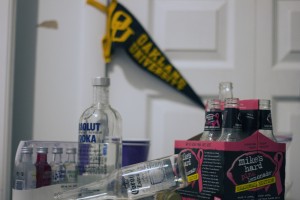Oakland University Minor in Possession arrests below average

Oakland University’s student population has been steadily increasing over the past few years, but the number of underage drinking arrests has not followed suit.
So far this year, the OU Police Department has reported nine alcohol-related arrests on campus — a relatively low number considering fall’s unprecedented enrollment.
Considering the recent population growth and campus updates, some students are not as familiar with Oakland’s policy on underage drinking as may be necessary.
University policy
Despite what some students believe, Oakland is not a “dry” campus, said OUPD Captain Mark Gordon.
“Oakland University has a policy that you can drink in your room, with the door closed, if you are over the age of 21 and are not in the company of anyone under 21,” he said.
The university also has a “zero tolerance policy” for drinking under the age of 21, according to Gordon. This policy includes educating students on the dangers of underage drinking as well as taking a proactive approach to any illegal use of alcohol on campus.
Students found to be in violation of the law are not given a warning. Instead, they receive a Minor in Possession violation.
A Minor in Possession of alcohol, or MIP, is defined by Michigan state law as anyone under the age of 21 who attempts to purchase, consume or possess alcoholic liquor except where excused by law. The Michigan MIP law was amended in 2004 to include any blood alcohol content as possession of alcohol.
Keeping it contained
Based on Oakland’s yearly Safety and Security Report, OU has significantly less alcohol-related arrests per 10,000 students that some other major state universities.
Last year, there were 22 arrests on campus. If the University of Michigan had the same amount of students, it would have had roughly six times as many arrests as OU last year — Michigan State University would have had 18 times as many.
“We really, really push alcohol education and alcohol awareness … I think it goes a long way in reducing the number of MIPs that we see on campus,” Gordon said.
Another factor contributing to OU’s low number of yearly alcohol arrests compared to some other state universities is the number of students living in OU campus housing, according to Gordon.
“Most MIP enforcement actions take place on evenings or weekends when class is not in session,” he said. “With less students on campus, you’re statistically Oakland going to get a lower number of infractions.”
Caught on campus
Despite low numbers, underage drinking arrests happen on campus every semester.
A 20-year-old junior and marketing major who wished to remain anonymous said she received an MIP violation in 2010 when she was caught drinking alcohol in Hill House with friends.
“The RA asked for our student IDs and called OUPD,” she said. “I was breathalyzed and blew a 0.08.”
She was required to complete 12 months of probation, alcohol awareness training in Hamlin Hall and 20 hours of community service to keep the violation from appearing on her permanent record, she said.
The student said although some students under 21 do drink on campus, she does not believe underage drinking is a concern for OU.
“It’s a bigger problem at other campuses for sure,” she said. “University Housing takes it seriously here.”
Eliminating offenses
Gordon said keeping underage drinking under control on campus is about student safety, which is why Oakland abides by Michigan’s medical amnesty law.
This law, which became effective last June, states that minors under the age of 21 who are under the influence of alcohol will not receive an MIP violation if they voluntarily seek medical assistance for a legitimate health concern.
OUPD hopes to educate students to avoid underage drinking entirely, Gordon said, because of both the health risks and legal repercussions.
According to Gordon, MIP violations should be taken seriously. The penalty for underage drinking can be as serious as a criminal record that is not only visible to schools and universities, but to future employers as well.
“We really hit the problems of underage drinking, the penalties and how it can mess up your life for a while,” he said.







